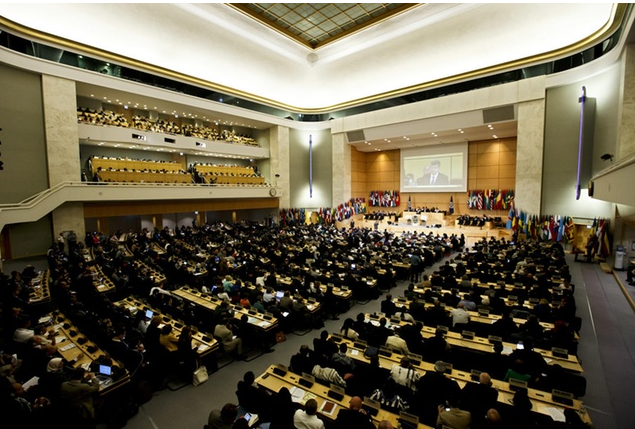
Delegates at the ILO’s annual conference in Geneva last year
Employees who are active in trade unions are not sufficiently protected from being sacked in Switzerland, according to the International Labour Organization (ILO). The Geneva-based body has added Switzerland to a blacklist – just before a centenary conference in the Swiss city.
The list comprises 40 countries that violate ILO conventions. Together with Greece and Belarus, Switzerland is the only European country to feature.
Switzerland is accused of failing to comply with international obligations, such as the ILO conventionexternal link on protection against dismissal for union activity, which Switzerland ratified in 1999.
While dismissal is against Swiss law if it is the result of legitimate trade union activity, the maximum compensation for wrongful termination is only six months’ wages.
This is insufficient for the ILO, which had already complained in 2004 that this was not enough of a deterrent for employers and the law effectively silenced unionised workers. The ILO report, on which the list is based, gives the example of a hospital in Neuchâtel which fired employees after a labour dispute.
The ILO stresses that compensation for wrongful termination should meet certain conditions and should be appropriate to the size of the company. A large company would have to pay more than a small or medium-sized business.
Warning shot
The fact that Switzerland is on a blacklist is an embarrassing warning shot, said Luca Cirigliano from the Swiss Trade Union Federation. It showed that Switzerland had not done its homework and that something must now change, he said.
The State Secretariat for Economic Affairs (SECO) said it had taken note of Switzerland being placed on the ILO “longlist”. The list will be discussed at the Centenary International Labour Conference, which begins in Geneva on June 10. It will then be decided whether to add Switzerland to the shortlist of 25 countries. In that case, Switzerland would be reprimanded and asked to do something.
Whether or not a country gets blacklisted is decided by the ILO Commission on the basis of several criteria. These include the severity of the problem, the urgency of the situation and the quality and detail of the government’s response.
Full story here Are you the author? Previous post See more for Next postTags: Business,newsletter



























